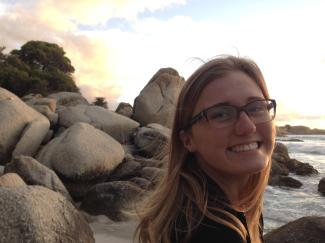
Maggie Taylor is a senior in the College of Arts and Sciences with a major in Heath & Societies and Economics. Thanks to a grant from Penn Abroad's Global Internship Program, Maggie was able to particpate in the South Asia Center (SAC) Summer Research Internship Program in Kandy, Sri Lanka. Here is what Maggie had to say about her experience working with the International Centre for Ethnic Studies (ICES):
Sri Lanka’s fertile soil and tropical climate make it an ideal environment for growing many crops—and the country does just that. Unfortunately, in the past three decades the island’s farmers and other rural citizens have seen a growing incidence of Chronic Kidney Disease of Unknown origin (CKDU). The cause of CKDU remains unclear despite over twenty years of scientific and sociological research. While public health scholars typically much prefer proactive, preventative measures to reactive, treatment measures, in the case of CKDU the former presents much difficulty given the community and experts alike cannot agree on a cause. CKDU symptoms often don’t appear until later stages, when it quickly becomes debilitating. Patients are left with compromised economic livelihoods resulting from the high costs of treatment, mostly associated with cost of travel to tertiary care centers, coupled with their inability to work.
With the generous help of the International Centre for Ethnic Studies’ Dr. Tudor Silva, I went to Sri Lanka to study a new health intervention for CKDU called Continuous Ambulatory Peritoneal Dialysis (CAPD). CAPD can be done at home, saving rural patients the time and high cost of travel the alternative treatment, hemodialysis, requires. After speaking with CKDU patients both using and not using CAPD in the small village of Wilgamuwa, as well as health and government administrators at the local and national level, I put together a case study report on the successes and barriers in Wilgamuwa’s pilot CAPD program. Ultimately, I found CAPD offers a significant advantage over other treatment options; patients’ personal experiences with CAPD carry great weight when they are deciding whether or not to use the new technology; home infrastructure is regarded as the greatest barrier to CAPD adoption, but it may be able to be temporarily mitigated; and government-constituent miscommunication regarding CKDU entitlements needs to be better managed.
From a professional standpoint, this research challenged my ethnographic skills in interviewing and observation. I’ve witnessed what sociological research looks like on the ground, and my case study report demanded a sociological writing style less familiar to me. Personally, I loved being able to see different parts of Sri Lanka. I learned from two different host families about their day-to-day lives, oceans away from my own home, and I reveled in the abundance of flavorful curry, fresh mangoes, avocados, pineapple, and passionfruit. I grew more confident in my ability to get around independently, even amidst a language barrier. I had time to personally reflect on my position as a white American researcher in a South Asian country, and what it meant for me to be temporarily taking up space in Sri Lanka.
For students considering this program, know that you have to be self-starter. Dr. Silva and ICES will be there to support you, but your experience will be what you make of it. Try to organize your project as much as you can beforehand, so that you spend as little time possible doing busywork preparations that could have been done anywhere. This will allow you to get as much as you can out of actually being in Sri Lanka! I absolutely recommend this SAC/ICES internship for anyone who can take initiative, be a respectful traveler, and is looking for an international social science research experience.
